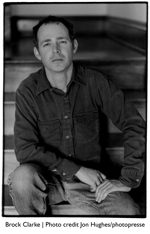Carrying the Torch
Winner of the 2004 Book Prize in Fiction
About the Book
The stories in this collection occupy a world at once as familiar as a suburban backyard or a southern college’s hallowed football field and as strange as a man who buys Savannah, Georgia, and tries to turn it into the perfect Southern city as part of his attempt to win back his estranged wife. The fictional territory of Carrying the Torch, is in short, Brock Clarke’s, one in which the surreal and the hilarious share a neighborhood with the painfully real and the sweetly ironic. Here readers will encounter characters dislocated by work and love, by huge losses and life’s small dramas, men and women who have migrated South in search of redemption—or at least in the hope of leaving the worst behind.
In these tales about what people try to leave and find they can’t, about the lies we tell the people we love and the myths we create to make life livable, Marly Swick cites an “exceptional originality” as well as an “amazing emotional resonance, a haunting quality.” “Notable for their balance of sentiment and restraint, the music of their language, and the haunting human longing that coexists with the irony and the humor,” as Lee Martin remarks, these remarkable stories carry forward a tradition reaching from Flannery O’Connor to John Cheever and Donald Barthelme—and arrive at a brilliance all their own.
Praise
“Be prepared to be surprised on every page of Clarke’s collection of brilliant short stories. . . . Clarke’s literary bombshells are . . . of the appreciatively hushed ‘wow!’ and ‘whoa!’ variety that accompany a sublimely crafted sentence or a distinctive turn of phrase that comes seemingly out of nowhere, with its unexpected ability to render large truths in such a pithily appropriate way that even the most critical reader will sit up and take notice.”—Booklist
“Clarke maps out the New South in the nine assured stories of his second collection, subtly linking America’s decaying Northern cities and Southern suburban sprawl with the frayed emotional microcosm of the migratory families who inhabit these territories. . . . Clarke’s light touch in these layered stories brings home the plight of his unfaithful husbands, dissatisfied wives and angry children in search of home and meaning.”—Publishers Weekly
“Brock Clarke’s latest short story collection is his most compelling, balanced, and well-executed offering to date. . . . Carrying the Torch is above all a series of earned moments that always feel genuine. Undoubtedly, this collection cements Clarke’s place among the exciting new voices in American fiction.”—Lydia Wilkes, Indiana Review
“The collection shines with originality and with characters so unique and sad, readers can’t help seeing themselves in them. . . . Carrying the Torch is solid and the writing and characters memorable, proving once again Clarke’s strength as a storyteller.” —Erin Flanagan, Shenandoah
“Clarke is particularly attuned to the ragged hearts of desolate places: the empty silos, the silent mills, the rail sidings to nowhere with their boxcars of nothing, the streets of sorrow, the gaunt, spidery places. And yet he is never overcome by it: his voice is always ironic, wistful, daring, and funny in a minor key.”—Mark Shechner, Buffalo News
“I found Clarke’s stories entertaining and often thought provoking. His stories hook you in and force you to think about the nature of relationships; the way we rationalize our actions; and the way we perceive the world outside of ourselves. . . . I think you will find it worth your while.”—Collected Miscellany
“Clarke’s wistfulness is perfectly balanced by his whimsy. . . . The characters in Carrying the Torch are rich and believable, the transitions from satire to wistfulness handled deftly, the language playful. While the turns in a few of the stories are sometimes predictable, in others—particularly in ‘The Ghosts We Love’ and Carrying the Torch—they are surprising and satisfying. These two stories, along with ‘For Those of Us Who Need Such Things’ and ‘The Fund-Raiser’s Dance Card’, merit re-reading to try to catch Clarke’s quiet transitions, and be caught breathless again by his subtlety.”—Michael Hartford, Small Spiral Notebook
“It takes a uniquely sympathetic vision to render contemporary suburban America without sentimentality or condescension, and Clarke has it. The stories in Carrying the Torch are full of sympathy—complex, hard-won, and real.”—Matthew Purdy, Iron Horse Literary Review
“There exist but a few undeniable truths in regards to writing short stories, I believe. Any forthcoming textbook needs to include Carrying the Torch in the ‘Make the Miraculous Seem Everyday, the Everyday Miraculous’ chapter. Brock Clarke’s stories are exquisitely smart and funny and honest. I promise that these characters will pull you into their lives faster than a junkyard magnet attracts paper clips. Brock Clarke’s a writer’s writer.”—George Singleton, author of Why Dogs Chase Cars
“Nobody carries the torch passed by John Cheever more ably and wittily than Brock Clarke in these funny, dark, and knowing stories.”—David Gates, author of Jernigan and The Wonders of the Invisible World
